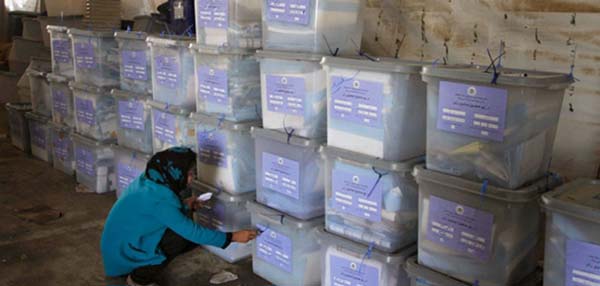The election process is seemingly in the right direction as the Independent Election Commission (IEC), led by newly-appointed commissioners, is attempting to lead a fair and flawless process and the public trust toward the next year’s presidential election is growing. In his recent exclusive interview, IEC Chief, Yosouf Nooristani, stressed that the commission will remain committed to its obligations and act impartially to run a fair and transparent election. In recent weeks, we have witnessed a flurry of behind-closed-door political meetings for coalition-building ahead of the election schedule for presidential nominations. By each passing day, political parties and political figures including government officials and Jihadi leaders are sending signals of making deals for coalition-building for the 2014 presidential election.
As the IEC chief has rightly stressed, impartiality of the IEC will be the key for building a national consensus among the main stakeholders on how to safeguard the forthcoming election with an outcome acceptable to everyone. Afghanistan has experienced fraudulent elections in the past, and the reminiscence of those electoral malpractices and irregularities is daunting both for the people and for the IEC who is well aware of its role in the ongoing political transition in the country. The parliament and the appointment process of the new commissioners for the IEC must build IEC on the optimisms that already have spread as the result of the approval of the election laws.
Still, numerous threats exist that could seriously harm the election process and the vital public trusts on it, if not derail the process. The IEC should strongly confront any efforts to influence the body, particularly by the government and other major players. There are many who believe that the government could influence the IEC as many of its members have close ties with top government officials and some have had direct backing from President Karzai in the past. Also, there have been efforts by some circles of President Karzai’s supporters to prolong his mandate beyond the constitutional limit after 2014. But so far, the president himself has been cautious to any moves that could be interpreted as his efforts for delaying or manipulating the elections or even sticking to power after his legal term.
In a move ostensibly aimed at assuring the nation and removing the skepticisms, President Karzai’s spokesman has said that the president is not going to put weight behind any candidate despite that he will make consultations with political figures and his advisors regarding the election process and the future of the country. Despite this, there is no guarantee that the government won’t use its control on power or the influence it has over the IEC to manipulate the election and influence the outcome of the process. One of the top challenges ahead of the IEC is that many major political circles, including the government, would inevitably try to influence it during the election process. If the IEC officials stick to its obligations and the promises, it will be able to run a relatively fair and credible election with outcomes acceptable to every major stakeholder.
For this, the IEC should make consultations with all political parties and consider a role for the civil society. The civil organizations could be a potential partner with the IEC to monitor the election process and help building the consensus needed for the whole process. Therefore, involving the civil society and the media in the monitoring and even the decision-making process would help the IEC to counter the influence of power circles and boost public awareness about the election process. Close involvement of the civil organizations will considerably boost public trust and confidence to the election process.
The IEC, which is trying to portray a positive view of its conduct, and its new chief should resist to the pressures exerted from outside, both the government and other powerful power circles who will try their leverage on the Election Commission and its commissioners. However, the fact that the head and commissioners of the IEC have found their ways to the IEC through the Selection Committee is an assurance that they will act responsibly, because they have fought their way to the IEC through a competitive process rather than being directly appointed to their posts. With this, the commission has long way ahead to prove itself of being independent and gain the public trust as the election timetable is getting closer.
On the other hand, security remains as the most difficult challenge ahead of the election. Despite that the security officials have made assurances regarding protecting the election process and the polling centers, there are widespread concerns regarding security of the election and how it would impact the process. Former IEC chief, Fazl Ahmad Manawi, recently raised skepticisms about ability of the Afghan National Security Forces (ANSF) to provide adequate security for the ongoing voter registrations and the presidential election. Manawi said that the assurance given by security agencies to the IEC is misleading, exaggeration and unrealistic based on security conditions on the ground and the previous parliamentary elections.
The possible inability of the security agencies to open polling centers in many volatile regions across the country would have enormous negative impacts on the process. The Taliban will anyway try to target the election process and the people who participate in it. In his Eid message, the Taliban Supreme leader, Mullah Mohammad Omar, dismissed the presidential elections as a game, warning the people not to go to polling centers for voting. If the security agencies fail to provide sufficient security for the election process, the Taliban would gain the privilege of disrupting the process, at least in some parts of the country. For a viable and credible election, it is crucial that the security agencies take large-scale plans, perhaps transitional and specific for the elections, to keep enough polling centers open in every major zone in the country.

